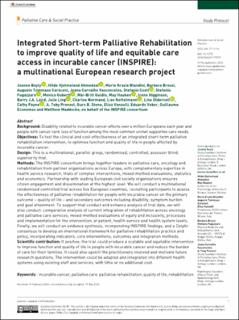Integrated Short-term Palliative Rehabilitation to improve quality of life and equitable care access in incurable cancer (INSPIRE): a multinational European research project
Bayly, Joanne; Ahmedzai, Hilde Hjelmeland; Blandini, Maria Grazia; Bressi, Barbara; Caraceni, Augusto Tomasso Giovanni; Carvalho Vasconcelos, Joana; Costi, Stefania; Fugazzaro, Stefania; Guberti, Monica; Guldin, Mai-Britt; Hauken, May Aasebø; Higginson, Irene; Laird, Barry J; Ling, Julie; Normand, Charles; Nottelmann, Lise; Oldervoll, Line Merethe; Payne, Cathy; Prevost, A. Toby; Stene, Guro Birgitte; Vanzulli, Elisa; Veber, Eduardo; Economos, Guillaume; Maddocks, Matthew
Journal article, Peer reviewed
Published version

Åpne
Permanent lenke
https://hdl.handle.net/11250/3090381Utgivelsesdato
2023Metadata
Vis full innførselSamlinger
Sammendrag
Background:
Disability related to incurable cancer affects over a million Europeans each year and people with cancer rank loss of function among the most common unmet supportive care needs.
Objectives:
To test the clinical and cost-effectiveness of an integrated short-term palliative rehabilitation intervention, to optimise function and quality of life in people affected by incurable cancer.
Design:
This is a multinational, parallel group, randomised, controlled, assessor blind, superiority trial.
Methods:
The INSPIRE consortium brings together leaders in palliative care, oncology and rehabilitation from partner organisations across Europe, with complementary expertise in health service research, trials of complex interventions, mixed-method evaluations, statistics and economics. Partnership with leading European civil society organisations ensures citizen engagement and dissemination at the highest level. We will conduct a multinational randomised controlled trial across five European countries, recruiting participants to assess the effectiveness of palliative rehabilitation for people with incurable cancer on the primary outcome – quality of life – and secondary outcomes including disability, symptom burden and goal attainment. To support trial conduct and enhance analysis of trial data, we will also conduct: comparative analysis of current integration of rehabilitation across oncology and palliative care services; mixed-method evaluations of equity and inclusivity, processes and implementation for the intervention, at patient, health service and health system levels. Finally, we will conduct an evidence synthesis, incorporating INSPIRE findings, and a Delphi consensus to develop an international framework for palliative rehabilitation practice and policy, incorporating indicators, core interventions, outcomes and integration methods.
Scientific contribution:
If positive, the trial could produce a scalable and equitable intervention to improve function and quality of life in people with incurable cancer and reduce the burden of care for their families. It could also upskill the practitioners involved and motivate future research questions. The intervention could be adapted and integrated into different health systems using existing staff and services, with little or no additional cost.
